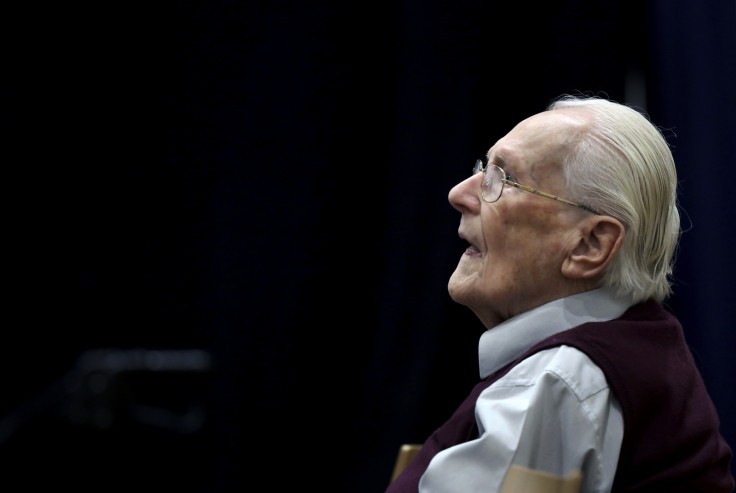Oskar Groening trial: Auschwitz Bookkeeper says he can only ask God for forgiveness

A 94-year-old former Auschwitz guard told his trial in Germany he shared responsibility for the Holocaust and felt he had no right to ask anyone but God for forgiveness.
Oskar Groening said that because of the scale of the atrocities committed he could not ask for the victims' forgiveness. "I do not believe I am entitled to make such a request," he said in a statement read out by his lawyer because of his frail condition at Lueneburg state court, AFP reported. "I can only ask my Lord God for forgiveness."
An ex-SS non-commissioned officer deployed at Auschwitz as a guard from 1942 to 1944, Groening had previously confessed to "moral guilt" over the mass murder of Jews under the Nazi regime.
In the statement he said the trial had opened his eyes to the wider suffering experienced by survivors before deportation and after they were freed.
"I had no idea about the terrible conditions during the deportations -- that shocked me," the statement said, according to AFP. "It also became clear to me how much Auschwitz and the Holocaust influenced the lives of the witnesses I heard here. They have obviously suffered their whole lives from their experiences in Auschwitz and the loss of so many loved ones."
Despite his general admission of guilt, Groening is denying charges of alleged complicity in the murder of 300,000 people, mainly Hungarian Jews, who were killed at Auschwitz between 16 May and 11 July 1944.
His defence argues he was tasked only with collecting and tallying money and valuables plundered from Jews and other victims, a job that made him infamously known as "the Auschwitz bookkeeper".
Prosecutors instead maintain that, as a camp guard in that period, he should be held responsible for murders committed there, even without evidence that he was directly involved in any killing.
They also allege he helped the Nazis benefit economically by dealing with the belongings stolen from the victims.
A key issue in the trial, which might see Groening jailed for up to 15 years, is how often he served on the infamous arrival ramps where part of the news deportees were selected to be sent straight to the gas chambers.
The proceedings have also ignited a debate on the merit of handing prison sentences to elderly former Nazis.
Eva Kor, an 81-year-old Jew who survived Auschwitz but lost her parents and older sisters at the camp in 1944 argued Groening would better serve society doing community service and denouncing the crimes he witnessed to fight neo-Nazis and revisionists.
Others argue that not serving justice, even decades from the crimes, would be an insult to the victims.
© Copyright IBTimes 2025. All rights reserved.




















